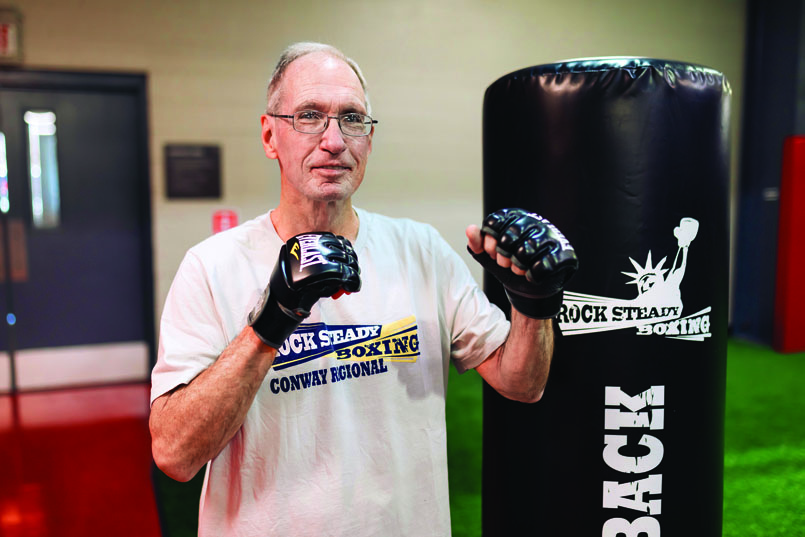31 Mar 2022 Rock Steady Boxing helps slow symptoms in Parkinson’s disease patients
By John Patton
The late Mohammad Ali, whom many consider to be the greatest heavyweight boxer of all time, passed away from complications of Parkinson’s disease in 2016. The boxer was known as an activist, entertainer, poet, philanthropist, and in his later days, a spokesman for Parkinson’s disease awareness.
Ali would likely smile at the irony that the sport that may have caused his Parkinson’s disease is being used to help reduce its debilitating symptoms in others. Health studies have indicated that head trauma increases the risk of developing Parkinson’s.

Rock Steady Boxing, a national program that offers a non-contact boxing-based fitness curriculum, is designed to slow symptoms of Parkinson’s disease. The new, medically supervised class is being offered at the Conway Regional Health & Fitness Center.
“While there is no cure for Parkinson’s disease, there is research that indicates that more intense exercise has been shown to improve patients’ balance, posture, and other symptoms,” said Mallory Lefler, fitness coordinator at Conway Regional Health & Fitness Center. She achieved a specialized certification to lead the program and is also an ACE certified personal trainer.
Tim Freyaldenhoven, M.D., Ph.D., a neurologist with the Conway Regional Neuroscience Center, said formal clinical assessment of outcomes of the program shows improvements in balance, energy, response to medication, and quality of life scores. “I can say that, anecdotally, I have had several patients participate that feel like their energy, stamina, and balance have improved,” said Freyaldenhoven. “They also enjoy the social aspect of meeting with a similar group of patients.”
Danny Slay of Conway, who was diagnosed with Parkinson’s disease two and half years ago, said he began searching for a Rock Steady Boxing class near him because of a friend who participated in one in Hot Springs. “He called it a game changer. That’s what we’re all looking for; we want to stave off the progression of those symptoms for as long as we can.”
He added, “We work on balance, core, strength, and endurance – the things that Parkinson’s affects in people.”
Slay adds, “Balance is big because people who have Parkinson’s have a fear of falling and it’s really helped with that. It’s helped me in every way.”
Lefler has noticed improvements after a few months. “His jogging has turned into more of a run. His punches are a whole lot harder. In all of his moves, he gives 100%. I have no doubt that this class will be beneficial for Danny in the long run.”
Allan Mueller, also of Conway, was instrumental in starting the program in Conway. He was participating in a class in Jacksonville and was needing a class closer to home, so he contacted the Conway Regional Health & Fitness Center. Mueller credits Rock Steady boxing for improving his overall strength and balance. “It helps your strength because you are exercising every part of your body, and balance is one thing that most people with Parkinson’s suffer with in one way or another.”
A retired wildlife biologist and avid traveler, Mueller appreciates that “everyone benefits from the class because the staff has been very good at helping people find their own level of participation.” The class also offers fellowship. Slay said, “We’re like a Parkinson’s band of brothers and sisters. The camaraderie has been good.”
Slay and Mueller are part of the original group of 12 people who participated in a start-up meeting in August of 2021. The classes began shortly afterward with a brief interruption as the fitness center paused due to COVID-19.
Training like a Boxer
During the course of an hour-long class, the Parkinson’s patients train in a boxer-like routine.
“We use dumbbells, row machines, bicycles, balancing exercises; they do squats and jump rope,” said Lefler. “It’s not just hitting the heavy bag. If the boxer can’t fully do an exercise, we modify it so they can get the benefit.” For instance, a boxer can remain in a wheelchair while striking the bag.
“Before they start the class, I take them through an assessment to determine where they are at physically,” said Lefler.
Noah Bandy, an ACE certified personal trainer who assists Lefler, added, “We start with a get-to-know-you question because voice production is a key for Parkinson’s patients.”
Bandy said the class overcomes reluctance to exercise. “Most of our boxers don’t believe in themselves, but once they get help and see what they can do, they start believing. It’s inspiring to see people do these things as if they don’t have Parkinson’s.”
The boxers also have “corner men,” relatives or friends, who support them during class.
The class progresses in intensity. “They push us so we have some pretty grueling exercises,” said Slay. However, Mueller noted that “everyone keeps coming back.” Slay added, “It’s not just an exercise class. It’s fun and everybody gets into it.”
Rock Steady Boxing also affects the instructors.
“They’ve made me cry a few times because of stories that they tell and the benefits that they have seen. I want them to lead a normal life,” said Lefler. “That’s what’s in it for me, a healthy life. Hearing their stories of what they are getting to experience outside of Rock Steady Boxing has been amazing.”









